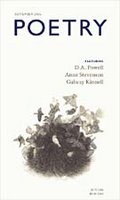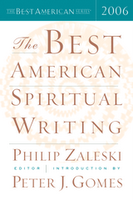
Not much for personal reading these days. Bogged down with the paying job. But a few things have come my direction....
Poetry Magazine. The double July/August "Humor Issue" is better than last year's. There were some fine parodies, a few attacks on Bush (who frequently provides paint to the palette of every humorist), and some interesting cartoons.
The September issue had a few fine pieces, but what struck a chord with me was Dan Chiasson's review of Mary Karr's Sinner's Welcome. There are two serious problems with this review. First, Chaisson uses his forum to attack religion in general. He writes, "Sinners are going to like it: in a culture where conversion-narratives, particularly if they involve a certain crucified someone, sell books, and elect presidents, Karr seem to have found another very marketable story to tell" (450). So Karr's faith is not genuine because the idiot president used religion to get elected? So Karr's poetry isn't good because she happens to profess to believe in God and actually allow her poetry to be colored by her beliefs and her spiritual struggles? In discussing Karr's afterward, Chiasson belittles religious people of every faith by misreading her intent and writing that Karr "presents her HBO-ready conversion in commodity terms" (451).
Chiasson further misses the mark when he writes of Karr's poems, "There has never been a style more gilded with workshop aptness" (451). Okay, maybe some of the poems read like they have been through the workshop wringer. But isn't it ironic that Poetry often features pieces decrying such work, yet the majority of what they publish (particularly from new poets) comes from just the same place.
Click here should you wish to read my review of the same book.
 Finished reading The Best American Spiritual Writing. This seems to be an eclectic mix of genres that in some general way are about spirituality. Actually, most of the pieces seem to be personal essays and poetry, so I was mostly right at home. After wading through the forward and introduction, I found myself reading through "The Gift of the Call," an essay that might have had more resonance with me had I expected a personal testimony. Not a great start, but then I read "The Acusmata of Pythagoras" by Brian Blanchfield. Here, if nothing else, was something new. When I got to "Best of Intentions" by Harvey Cox (after some thoughtful poems), I was a little more into the book. I may have been biased at his focus on teaching and tolerance, but I think this piece is worth reading. "Sighs Too Deep for Words" is an honest account of Helen Gardner's spiritual journey summed up well by the subtitle: "On Being Bad at Reading the Bible."After a few more okay, but not terribly memorable essays, I found myself reading two moving pieces, Todd Gitlin's "A Skull in Varanasi, a Head in Baghdad" and "When the Candle Is Blown Out," by Natalie Goldberg. I liked reading, after these, the meditation on suicide bombers by Mary Gordon called "Appetite for the Absolute." I don't think I understood what I believe is the only short story in the collection, "Dr. King's Refrigerator" by Charles Johnson. I did like the essay "High Fidelity" by Bill McKibben about people who stay through many changes in their church over the course of their long lives. "Kierkegaard for Grownups," by Richard John Neuhaus, is particularly interesting and informative. I am still at a loss to understand the inclusion of Oliver Sacks' essay "Speed." I had read it before in the Best American Essays volume, and reading it again helped me appreciate it more, but I didn't see it as a spiritual piece of writing, even in the broadest sense. On the other hand, I found Huston Smith's "The Master-Disciple Relationship" and Kenneth L. Woodward's "The Passion's Passionate Despisers" to be thought provoking.
Finished reading The Best American Spiritual Writing. This seems to be an eclectic mix of genres that in some general way are about spirituality. Actually, most of the pieces seem to be personal essays and poetry, so I was mostly right at home. After wading through the forward and introduction, I found myself reading through "The Gift of the Call," an essay that might have had more resonance with me had I expected a personal testimony. Not a great start, but then I read "The Acusmata of Pythagoras" by Brian Blanchfield. Here, if nothing else, was something new. When I got to "Best of Intentions" by Harvey Cox (after some thoughtful poems), I was a little more into the book. I may have been biased at his focus on teaching and tolerance, but I think this piece is worth reading. "Sighs Too Deep for Words" is an honest account of Helen Gardner's spiritual journey summed up well by the subtitle: "On Being Bad at Reading the Bible."After a few more okay, but not terribly memorable essays, I found myself reading two moving pieces, Todd Gitlin's "A Skull in Varanasi, a Head in Baghdad" and "When the Candle Is Blown Out," by Natalie Goldberg. I liked reading, after these, the meditation on suicide bombers by Mary Gordon called "Appetite for the Absolute." I don't think I understood what I believe is the only short story in the collection, "Dr. King's Refrigerator" by Charles Johnson. I did like the essay "High Fidelity" by Bill McKibben about people who stay through many changes in their church over the course of their long lives. "Kierkegaard for Grownups," by Richard John Neuhaus, is particularly interesting and informative. I am still at a loss to understand the inclusion of Oliver Sacks' essay "Speed." I had read it before in the Best American Essays volume, and reading it again helped me appreciate it more, but I didn't see it as a spiritual piece of writing, even in the broadest sense. On the other hand, I found Huston Smith's "The Master-Disciple Relationship" and Kenneth L. Woodward's "The Passion's Passionate Despisers" to be thought provoking.Probably the best thing about this book is that it contains some pretty good poems sprinkled throughout. Almost every one is a gem, most by notable poets like Scott Cairns, Philip Levine, and Charles Wright. On the whole I recommend the book, though I supposed some will pick and choose pieces more to their liking.
Next month, I hope to write about a book in Lawrence Block's "Keller" series and perhaps one of Robert Parker's more recent Spenser books. But who knows....









No comments:
Post a Comment